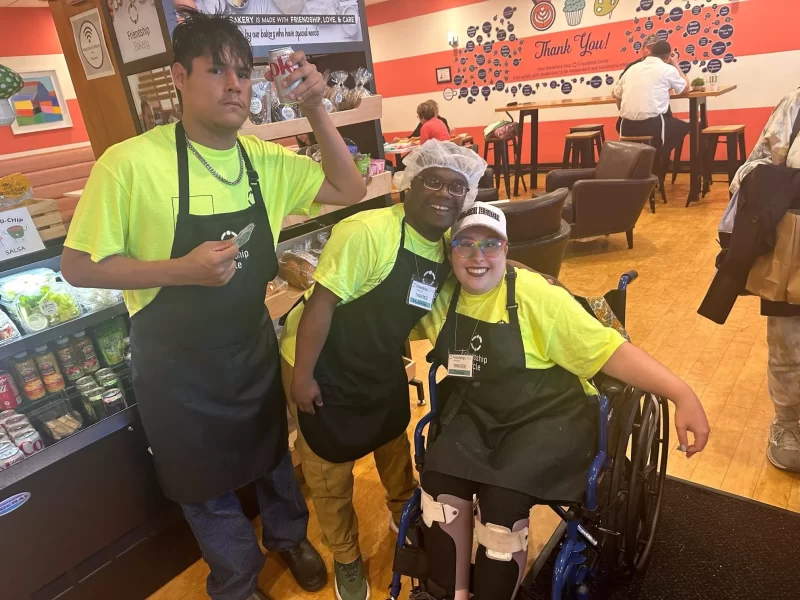
How a Cafe Staffed by Individuals with Disabilities Survived the Pandemic
by Nochum Paltiel – chabad.org
When Rabbi Levi and Leah Stein started at the Friendship Circle of Wisconsin in 2015, they envisioned assisting young people with special needs transition into the workplace. What they found was that approximately four-fifths of those with special needs were unemployed, underutilized and generally lacking career direction.
For those with special needs, finding a suitable program to feel accepted, understood and cared for can be a challenge. “We work with a lot of kids, and over time we began focusing more and more on the older cohort, as they age out of the younger program,” Leah Stein told Chabad.org. “In that space between adolescence and adulthood, there can be intense isolation.”
Due to this isolation, one of the first things the Steins did was to create an infrastructure to teach employability and life skills. In 2017, they launched the Employment Training Program (ETP) and have since developed a year-long training program for individuals to create the means to find work, and most importantly, a place to belong.
“The setup is really thoughtful and considerate of people with disabilities and sensory issues,” said Ness, a student in the program. “Instead of being convinced that I will never be able to work, Friendship Circle creates the opposite reaction: that I’ll feel ready and able to start working.”
The program already boasts over 30 graduates who are thriving in the Wisconsin workforce. The culmination of these efforts is the Friendship Café, which opened right before the onset of the pandemic in 2020, and is now the focal point of the operation.
The cafe allows adults with disabilities to learn the important skills needed to operate the cafe and its adjacent bakery. From making a latte, running the register, mixing ingredients, decorating desserts to packaging and delivering the finished product, the trainees are involved in it all, building independence and self-esteem along the way.

Covid Challenges
After getting off to a wildly successful start, the Friendship Café collided with Covid. With indoor closures and their staff forced into isolation, the cafe suffered much the same as other small businesses did around the country. In many ways it was even harder on the Friendship Café’s employees and volunteers, who after having just found their lifeline were now locked in and struggling to feel productive.
“It’s a whole different type of isolation,” Leah said of the challenges that people with special needs faced during the pandemic. “When in isolation, the loneliness and helplessness are even more starkly felt.”
So the operation had to pivot the way it delivered its services. It was all the Friendship Café could do to stay afloat, financially, and more importantly for those employees, emotionally.
“We became UPS, FedEx, Uber, you name it, we did it,” said Rabbi Stein, of the organization delivering thousands of packages over the course of the pandemic.
However, this was only a stop-gap solution. With its employees relying on the routine and consistency of the café for their positive mental health, it was imperative for the café to begin capacity work as soon as possible and with each challenge, the cafe found a way to stay open.
“Every single day we were sending out stuff the whole day,” said Leah. “A lot of the training program had to slow down. But we stayed open the whole time, which was amazing.”
And the community did their bit too, with people making the effort to buy from the cafe and bakery.
“That was amazing,” said Leah. “Milwaukee has always been very supportive from day one, but I do feel that there’s not so much barrier that there was before. People come for the food and stay for the mission.”
A Model Citizen
Having survived the pandemic, Friendship Circle of Wisconsin’s Friendship Café currently employs about a dozen people with special needs across the café, bakery, arts studio and in administrative roles. Friendship Circle also partners with nearly 50 local businesses to employ young people with special needs in a variety of roles.
One such employee was Jonathan, one of the training program’s first graduates, who tragically passed away last month at the age of 52.
Jonathan, said Rabbi Stein, was a role model for the entire Milwaukee community. He worked as a barista at the Friendship Café, where he was known for his sweet drinks and sweeter personality.
Jonathan even met his wife, Rachel, at Friendship Circle. The couple, who were both employed after graduating from the training program, were married for 13 years and enriched the lives of all around them.
“He always had a smile on his face, always grateful. Everyone has only nice, beautiful things to say about him,” Stein recalled. “He was a friend to everyone.”
Men and women like Jonathan, explained the rabbi, are the heart and soul of Friendship Circle, and what programs like the Friendship Café are all about.
“We took a holistic approach to creating community,” Rabbi Stein said. “Today, 10,000 people walk through our doors every year. Piece by piece, that community is coming together.”
















